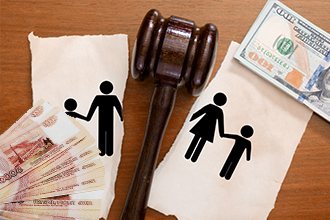The dissolution of the parents' official marital relationship or the termination of a civil marriage does not in any way affect the rights of the child regarding upbringing and communication with each of the parents. Dad and mom have equal rights and must fulfill the same responsibilities in relation to their own children both in the family and after its breakup. The division of property during a divorce, alimony disputes and other disputes between the head of the family and his wife should not have anything to do with the lives of the children. These fundamental rules are established in the current version of the Family Code of Russia.
However, after the marriage ends, one of the parents (in most cases, the father) ceases to live with the children in the same territory. In this regard, there is a need to regulate the procedure for his participation in the life of minors, namely in the areas of communication, education and upbringing. In other words, you need to figure out what right a father has to a child after a divorce and what are its limits? The answers to these questions can be found in this article.
List of father's rights to a child after divorce
The powers of the father, which he has the right to exercise in relation to his own minor children, can be divided into 3 groups:
- In the field of communication.
- In the field of education.
- In the field of education.
Communication and meetings
The list of rights granted by law to a father who lives separately from his son or daughter is shown in the table.
| List of powers | A comment |
| A child should not be deprived of communication if his parents live in different states. | The law does not allow depriving a minor and a parent of communication if they are separated by significant distances. Moreover, nowadays there are means of communication that make it easy to overcome such problems. |
| A father must take into account the interests of his children and during meetings not harm their psyche or physical health, as well as moral development. | This means that the father cannot:
|
| A stepfather who adopts a child acquires the same rights in relation to him that the biological father previously had, including the possibility of unhindered communication with him. | This rule is enshrined in Article 137 of the Family Code. |
| The father can demand from the mother that she does not create obstacles for him to communicate with his son or daughter. | This means that the mother cannot refuse the father to meet with the minor at the time established by agreement or judicial act, except in cases where the father:
|
| The father is obliged to take into account that his child, who has reached the age of ten, may refuse to meet with him. | The opinion of a ten-year-old minor must be taken into account when solving family problems, except in cases where this directly contradicts his legitimate interests. |
| The father has the right to demand the establishment of rules for communication with the child and the drawing up of a meeting schedule in an agreement concluded with the mother. If she refuses, the father can achieve what he wants through the court. | As a rule, during a divorce, a married couple determines the rules of communication with the child and the schedule of meetings between the father and him by agreement or with the help of the court. However, it should be borne in mind that in the future the father has the right to challenge the provisions of the agreement or court decision and invite the child’s mother to conclude a new agreement on the procedure for exercising parental rights. |
Upbringing

In this area, the father, including those who have not reached the age of majority, has the following powers:
- Taking care of your son or daughter. This means that he must satisfy children's needs that do not contradict the interests of the minor, ensure his safety from the adverse effects of the environment (heat, cold) and strangers, provide comfortable living conditions, supervise him, etc.
- Ensuring the child’s interests, for example, helping with sports (buying equipment and sportswear, taking him to classes, showing an interest in success).
- Ensuring comprehensive development in the moral, physical and spiritual spheres.
- When a child is born in an informal family union from minor parents who have not reached the age of sixteen at the time of his birth, they can ask the guardianship institution to appoint a guardian for the child.
- Protection of a minor from harmful educational measures carried out in relation to him by third parties, for example, kindergarten teachers or school teachers.
- Taking into account the opinion of a son or daughter when solving educational problems.
- Seeking help from a guardianship institution or court in case of disagreements with the mother on educational issues.
- Contacting social services for psychological or pedagogical help in case of difficulties arising during the educational process.
- Concluding a new agreement with his ex-wife regarding the raising of a small child. If she refuses, the father can seek protection of his interests through the court.
Education
In the educational field, father:

- Has the right of preferential education for his own child over third parties with the exception of the mother.
- He can, together with his mother, participate in choosing the school or kindergarten to which minor children will go.
- He can, together with the mother and taking into account the opinion of the minor, choose how the child will be educated (at school or home schooling).
- Obligated to provide the child with an education of at least 9th grade.
- Has the right to receive information about his son or daughter from employees of educational institutions, for example, information about academic performance.
Other rights
These include:
- Providing consent for the departure or relocation of a minor to a foreign country.
- Providing consent to change the surname.
Briefly about rights
The father's rights to the child after a divorce will be the same by law as the mother's. This means that the father remains the legal representative of the minor.
He has the right:
- choose educational institutions that the child will attend;
- receive information about the health status of minors;
- count on financial assistance from adult children;
- allow or prohibit travel outside the country;
- protect and represent children's interests in various organizations;
- live together with the child (usually this issue is resolved in court);
- receive financial assistance from your ex-wife if children do not live with her;
- participate in raising children.
As practice shows, parental rights after the termination of a marital relationship are often violated or they are regulated by peace agreements or the court.
Features of resolving controversial issues

If parents have disagreements on certain issues related to the upbringing, communication or education of children, they can draw up a written agreement in which they will determine the procedure for exercising the rights of the parent living separately from the children. It should be noted that the law does not provide for mandatory notarization for this agreement, but if the conflict in the future is referred to trial, then the notarized form of the document is preferable to a simple written one. This is due to the fact that judges trust notarial documents more than ordinary ones.
The structure of the agreement consists of:
- Headers indicating the name of the document, for example, “Agreement on the procedure for the exercise of parental rights by a parent living separately from the child”, locality, date of writing the agreement, as well as information about the father and mother (full name, passport details).
- The subject of the agreement, which is a minor child and the exercise of the parent’s rights in relation to him.
- Chapters that define the procedure for exercising the rights of a parent. In particular, the days of the week and the time allocated for meetings between the father and the minor are prescribed here, and the limits of educational measures that the father can carry out are determined.
- Chapters where the obligations and rights of the parties to the agreement are prescribed.
- Indications on the validity period of the document.
- Grounds for changing the agreement or terminating it.
- Procedures for resolving parental conflicts.
- Side paintings.
An example agreement can be downloaded here.
If mom and dad cannot agree peacefully, then the dispute is referred to the concerned parent for resolution by a judicial authority with the obligatory involvement of a representative from the guardianship institution.
The process of filing a claim and trial in court has several procedural features:
- This type of dispute falls within the competence of district courts. Magistrates do not have the right to accept it for proceedings.
- If the plaintiff is a parent living together with a minor child, then he can initiate a claim in a judicial institution both at the place of residence of the defendant and at his own place of residence.
- The court has the legal right, at a preliminary hearing, to determine the procedure for the exercise of parental rights by each of the parents for the period ending with the endowment of the decision with legal force. The judge may exercise this right if his actions are approved by a representative from the guardianship institution and with the consent of the children.
A sample statement of claim can be found here.
Property rights of children during divorce
Children after divorce must be permanently registered at the address of one of the former spouses until they turn 18 years old. Such registration entails the emergence of common property of the son or daughter and the parent in housing (apartment).
Look in more detail: how to divide an apartment during a divorce, what if there are children.
After a divorce, children have the right to receive equal maintenance from both the father and mother. Funds paid in the form of alimony must be spent on their expenses.
The parent paying child support may require that 50% of each amount be accumulated in the son's or daughter's personal account. The father and mother have no rights to the child's property.
List of documents for filing a claim
Along with the application in which the plaintiff formulates his demands, it is necessary to prepare a set of documents for submission to the court, namely:
- Certificate of termination of marriage.
- A certificate issued by the registry office in connection with the birth of a child.
- Documents confirming the absence of alimony debts. They can be taken from the employer if child support benefits are withheld through the organization’s accounting department; from bailiffs, if alimony is collected through deposit accounts of bailiffs. Evidence of the absence of child support debt will help the father form a positive impression of himself in the eyes of the judge.
- Documents for housing, for example, a certificate of ownership or a lease agreement. They are important if the father wants the court to allow meetings with the minor child in his home and allow him (her) to spend the night in the dad's home.
- Documents about the amount of earnings, for example, a 2-NDFL certificate from the employer or a tax return. These papers are also useful in creating a positive image of the father.
- If the mother does not allow the father to see his son or daughter, it is necessary to provide evidence of her illegal behavior, for example, recordings of telephone conversations, correspondence in instant messengers or social networks, testimony of relatives and acquaintances.

Often, judges do not accept screenshots of correspondence from instant messengers or social networks, as well as audio recordings as admissible evidence. To ensure their acceptance by the court, you need to do the following:
- For telephone conversations, record an audio recording on a flash drive and make a written transcript of the conversation. Next, you need to go to the post office and send the flash drive with the decryption by registered mail with a list of attachments and notification of receipt to the address of the district court. On the envelope next to the word “To” you need to indicate the name of the judge involved in the proceedings in your case.
- For screenshots of correspondence, you should print them out, go to the post office and send the screenshots by registered mail with a list of attachments and notification of receipt to the address of the district court. On the envelope next to the word “To” you need to indicate the name of the judge involved in the proceedings in your case.
Arbitrage practice
The case was considered by the city court of Dagestanskie Ogni of the Republic of Dagestan in July 2021.
The father sent a statement of claim to the court, in which he demanded to change the order of communication with his youngest son. In support of his claims, the plaintiff stated the following:

- He had previously been in a registered marital relationship with the defendant.
- After the marriage ended, the children remained to live with their mother. During the time that elapsed before the lawsuit was initiated, the procedure for communicating with minors was changed by the court twice.
- A new change in the rules of meetings and communication with the youngest son is necessary. This is due to the fact that the child has become attached to the plaintiff, comes to him with great desire and does not want to part with him. In addition, the plaintiff believes that male influence is very important for raising his son, so the time for communication should be increased, taking into account the time the child is in kindergarten and the plaintiff’s work schedule.
Additional demands of the father include the requirement to grant him the right to decide issues related to the education of minors and to allow telephone conversations with children during religious holidays.
The mother opposed the plaintiff’s claims, explaining that:
- Circumstances that would allow the plaintiff to claim an increase in the duration of meetings with his son did not arise, so his claims are unfounded.
- It does not prevent the son from meeting with his father at the times and days established by the court.
- The son, returning from his dad's, abruptly changes his behavior and begins to damage the furniture.
The representative from the guardianship institution spoke out against the father’s claims and pointed out that the circumstances considered in previous court hearings in a similar case had not changed.
Based on the opinions of the parties and the evidence presented, the court decided to reject the plaintiff and side with the defendant for the following reasons:
- In a similar case, three months before the present trial, the Supreme Court of the Republic of Dagestan rejected the plaintiff’s appeal.
- The plaintiff did not provide any evidence that would confirm a change in circumstances affecting his exercise of parental rights.
- Also, the father did not provide evidence that the living or material conditions of his ex-wife had worsened over the past three months.
Communication between a child and parents who are divorced
According to the law, both parents have the same rights regarding their child. Most often, the court determines that children live with their mother. It is worth noting that such a measure does not in any way affect the child’s rights of communication with his father. Of course, deprivation of parental rights can become one of the obstacles in communicating with a child.
Can one of the parents prohibit communication?
There are many situations when, after a divorce, a father or mother begins to manipulate a child. This happens in such a way that one of the parents says that he wants to let the child go to another, but he wants to and will not let him go. In this case, the second parent, with whom the son or daughter does not live after the divorce, has the opportunity to file a claim in court or reach an agreement with his former spouse. With the help of a statement of claim, the other party can ensure regular communication with the child.
Resolving the issue of communication with a child after a divorce can occur in two ways:
- In the first case, parents can agree with each other. Consolidation of the agreement can occur either verbally or with the help of the legal side. Consolidating an agreement with the help of a third party does not involve filing a lawsuit and depriving parental rights. In this case, the ex-spouses simply draw up a schedule of communication with the child. When spouses cannot solve this problem on their own, but do not want to resolve the issue through lawsuits, they have the opportunity to contact a lawyer who will help resolve the issue.
- In the second case, the issue is not limited to drawing up an agreement. This method of solving the problem necessarily includes filing a claim after the divorce. In this case, the child’s right to communicate with parents and other relatives is regulated with the help of the court.
The court's decision may be unpredictable. In some cases, it may result in the deprivation of parental rights of one of the spouses or the appointment of the plaintiff as the person with whom the child will live. Therefore, before filing a lawsuit or statement of claim to terminate parental rights or resolve a communication problem, carefully consider your litigation tactics and find a good lawyer.
Regulatory framework
| List of laws | List of articles |
| Family code | Article 53 – the rights of a child born in a civil marriage. Article 54 is a list of children’s rights regarding upbringing and living in a family. Article 55 – the right of minors to communicate with their father and mother, as well as with other relatives. Article 61 – equality of both adult and minor parents in rights and responsibilities in relation to children. Article 62 – list of parental rights of father and mother under eighteen years of age. Article 63 is a list of powers of mothers and fathers in raising small children. Article 65 – the procedure for exercising parental rights. Article 66 – the procedure for how a father living separately from his son or daughter can exercise parental rights in relation to them. Article 78 is a norm on the mandatory participation of an employee of a guardianship institution in court hearings concerning the resolution of issues regarding the education of minors. |
| Civil Code (part 1) | Article 20 is the rule on determining the place of residence of minor citizens. Article 27 is the basis for vesting minor citizens with a full set of civil rights and obligations. |
| Civil Procedure Code | Article 24 – cases resolved by district courts. Article 28 – rules on jurisdiction at the location of the person who is the defendant. Article 29 – rules on jurisdiction at the location of the person who is the plaintiff. Article 152 – features of the preliminary hearing in court, if the issue of the procedure for exercising the rights of a parent is being decided. |
| Tax Code (Part 2) | Article 333.19 – court state fees. Article 333.24 – notary fees. |
| Code of Administrative Offenses | Article 5.35 is a punishment for a parent who deprives a minor of the opportunity to communicate with another parent. |
| Federal Law “On Education in the Russian Federation” | Article 44 is a list of the responsibilities and rights of parents in the education of their children. |
How can you determine the order of communication between a child and his parent and relatives?
Regardless of life circumstances, parents and relatives have an undeniable right to communicate with their child. This right is confirmed by Article 55 of the Family Code of the Russian Federation. At the same time, the child and one of the former spouses can count on personal walks with each other, telephone communication and conversations via the Internet. None of the former spouses or their relatives has the right to prohibit such a relationship.
What law regulates communication between a child and a parent?
Article No. 55 of the Family Code establishes several provisions regarding communication of a minor with his mother or father, as well as other relatives, grandparents, aunts, etc.
So, Article 55 defines the following rights of communication of a little person with his parents and his relatives:
- Any minor citizen has the right to communicate with his family, grandparents, brothers and sisters, as well as other people close to him. At the same time, the divorce of parents, their separation or the declaration of marriage as invalid are not reasons for terminating the relationship of one of the spouses or a relative with the child. If the parents live separately (including in different countries), the child has the same right to stay with each of them.
- In cases where a child is exposed to unnatural situations, he has the right to communicate with parents, relatives (grandparents, uncles, aunts, brothers and sisters), as well as people who replace parents. In this case, the situation is considered extreme when a minor child must make complex or legally sound decisions. These include: detention, detention, arrest, road accident, hospitalization, etc.
Clarifications to the law
The comments to the article of the RF IC indicate the features and explanations for the above points. The explanation for the first paragraph states that the above article establishes the right to communicate with parents, which can occur both in person and by telephone or via the Internet. Thus, the child has the right to communicate even in cases where the parents divorced or live in different states.
The note! The right of a minor to communicate with one of the parents when he lives in another country corresponds to paragraph 1 of Article 10 of the UN Convention on the Rights of the Child, which was approved back in 1989 and is in force. This article states that a child or parent has the right to submit an application to the appropriate institution to ensure family reunification. At the same time, one of the parents, together with the child, has every right to freely cross borders and assistance from participating countries.
The second paragraph of the article stipulates unhindered communication between relatives and the child in the event of an emergency. It is worth noting that conversations on the phone are also considered communication.
Communication with relatives in extreme situations is prohibited for the child if the relatives could cause him harm. When an offense is committed, the investigator or any representative of the law is obliged to warn parents (and, in their absence, relatives) within 12 hours about what happened.
Minor children under 14 years of age (at the discretion of the court and between the ages of 14 and 16) have the right to testify and be witnesses only in the presence of a teacher. Violation of this right is punishable by law.










